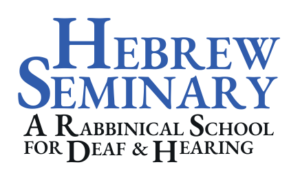Academic Programs
Introduction
Hebrew Seminary prepares Jewish leaders who can serve diverse communities of Jews, Jewish communities, multifaith communities, and seekers from all walks of life. To quote Hebrew Seminary’s Founder and Rosh Yeshiva of 30 years, Rabbi Dr. Douglas Goldhamer zikhrono livrakhah (זִכְרוֹנוֹ לִבְרָכָה, of blessed memory), “This is for everyone.” Hebrew Seminary seeks to bring the joy, wisdom, and warmth of Jewish life and tradition to corners of the world where the depths of Torah were once left unexplored. Hebrew Seminary prepares Jewish leaders to model and to actualize an accessible Judaism that embraces diversity, equity, and inclusion.
Three Programs
Hebrew Seminary hosts three academic programs, a Rabbinical School, a Pararabbinic Program, and a Mekhinah (‘Preparation’) Program.
| Rabbinical School | Pararabbinic Program | Mekhinah (Preparation) Program | |
| Approximate Length of Study for Full-Time Students | 5 years | 2 years | 1 year |
| Title Granted Upon Completion of Studies | Rabbi | Pararabbi
(note: this is an innovative model of Jewish leadership) |
N/A |
| What Graduates Do | Serve Jews, Jewish communities, multifaith communities, and seekers as spiritual, pastoral, ritual, moral, halakhic (Jewish legal), and intellectual leaders | Serve Jews, Jewish communities, multifaith communities, and seekers as spiritual, pastoral, ritual, and moral leaders | Approach eligibility for Pararabbinic Program and both Hebrew Seminary’s Rabbinical School and all other non-Orthodox rabbinical schools in North America |
| Overview of Subjects Studied | Biblical Studies (4 credits required)Diversity & Accessibility (2 credits required)Jewish History (5 credits required)Jewish Languages (2 credits required) Jewish Liturgy Jewish Thought Pastoral Care Practical Skills Rabbinic Literature Electives |
Biblical Studies (2 credits required)Diversity and Accessibility (1 credit required)Jewish History (1 credit required)Jewish Languages (4 credits required) Jewish Liturgy Jewish Thought Pastoral Care Practical Skills Electives |
Biblical Studies (3 credits required)Jewish Languages (2 credits required) Jewish Liturgy (2 credits required)Jewish Thought (1 credit required) Rabbinic Literature |
| Number of Credits Required for Completion of Program*
*most courses count as 1 credit each; certain credits may be fulfilled by prior study |
60 | 24 | 10 |
| Concentration Requirement | Yes (7 credits, from among the 60 credits of the program) | No | No |
| Senior Thesis Requirement | Yes | No | No |
| Estimated Total Cost of Full Tuition for Full Program**
**according to Fall 2023 costs; if taking 3 or more courses per semester; tuition fees subject to change; applicable scholarships and tuition aid may lessen tuition costs |
$45,000 | $18,000 | $7,500 |
Rabbinical School
Hebrew Seminary’s Rabbinical School, which consists of approximately 5 years of full-time study, grants the title of Rabbi to its graduates. Those who have been ordained through the Rabbinical School may go on to serve synagogues, hospitals, nonprofits, universities, and other Jewish and multifaith institutions that welcome the spiritual leadership of Hebrew Seminary’s ordainees. Rabbinical students at Hebrew Seminary grow to be masters of Jewish tradition and innovation as they study Jewish text, ritual, culture, and history from spiritual and academic angles. Click for more information about Hebrew Seminary’s Rabbinical School.
Pararabbinic Program
Hebrew Seminary’s Pararabbinic Program, which consists of approximately 2 years of full-time study, grants the title of Pararabbi to its graduates. Those who complete the Parabbinic Program at Hebrew Seminary may serve communities seeking spiritual leadership without the full religious authority vested in rabbis. Compared to the Rabbinical School at Hebrew Seminary, the Pararabbinic Program requires fewer courses focused on Judaism’s legal and intellectual traditions and emphasizes competency in ritual leadership. Individuals wishing to become Pararabbis aim to expand their familiarity with specialized skillsets that set them apart from laypeople. Pararabbinic students might already be serving Jewish communities that cannot afford to hire full-time clergy but still seek well-trained leaders. Prospective pararabbinic students may be unable to commit the time or finances required of a rabbinic education but might still want to become members of the broader field of Jewish clergy. Click for more information about Hebrew Seminary’s Pararabbinic Program.
Mekhinah Program
Hebrew Seminary’s Mekhinah Program, which consists of approximately 1 year of full-time study, derives its name from the Hebrew term mekhinah (מְכִינָה, “preparation”) as the program helps prospective rabbinical students become eligible for Hebrew Seminary’s Rabbinical School, as well as other rabbinical schools. Those who complete the Mekhinah Program satisfactorily are likely to be admitted into Hebrew Seminary’s Rabbinical School–although admission is not always guaranteed. By design, the Mekhinah Program helps acquaint students with the spiritual, social, and academic dimensions of Hebrew Seminary’s Rabbinical School. Students who are considering rabbinic studies but want to take a few courses to experience a taste of life as a rabbinical student can benefit from enrolling in Hebrew Seminary’s Mekhinah Program. Click for more information about Hebrew Seminary’s Mekhinah Program.
